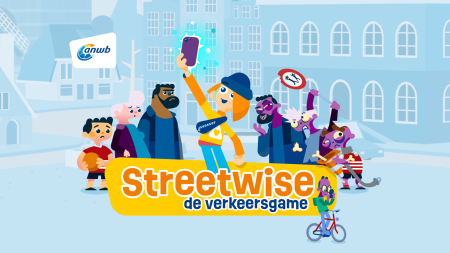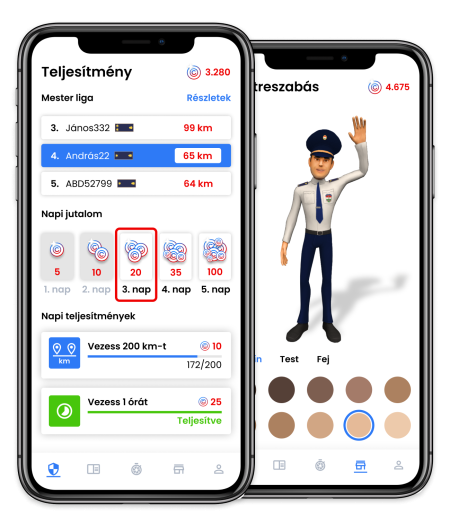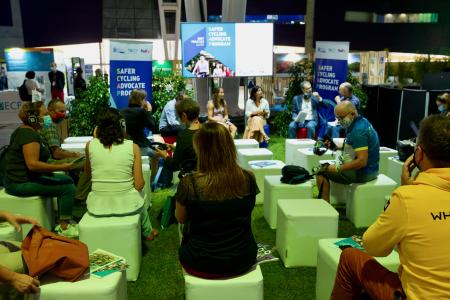Our members are dedicated to improving road safety and sharing their knowledge with the wider community. Here, you can explore our members' good practices – initiatives that have been assessed for their effectiveness in addressing a road safety problem and have proven results.
Get inspired – and sign up to share your good practices too!

Friday, June 3, 2022
As ANWB, we aim for zero road casualties in 2050. In order to achieve this ambitious goal it is of vital importance that kids start learning about road safety from an early age. The earlier they learn how to ride a bike and get safely from point A to point B the more responsible traffic participants they’ll become in the future.
We already offer an all-round educational road safety program for elementary schools throughout the Netherlands with a annual reach around 150.000 students per year. However, both teachers and parents agree that traffic education is primarily the responsibility of parents themselves and should not only happen at school. We challenged ourselves to come up with a solution that encourages kids to learn about road safety at home and offers parents tools to talk about traffic behaviour and practise concrete traffic related situations with their children.
We already offer an all-round educational road safety program for elementary schools throughout the Netherlands with a annual reach around 150.000 students per year. However, both teachers and parents agree that traffic education is primarily the responsibility of parents themselves and should not only happen at school. We challenged ourselves to come up with a solution that encourages kids to learn about road safety at home and offers parents tools to talk about traffic behaviour and practise concrete traffic related situations with their children.

Friday, June 3, 2022
Riksförbundet M Sverige has been working to make Swedish roads safer for 100 years. M Sverige, as a member club, holds an important place as an active partner with government institutions and the road using public in the effort to reduce road crashed and reach Mission Zero (Nollvisionen). M Sverige has always focused on and worked with our partners to make roads and cars safer and while also focused on making road users safer, this solution that we have launched goes beyond communication and education and delivers real world, targeted and personal solutions to the Swedish public.
Our main focus with this project is to develop safer road users.
Our main focus with this project is to develop safer road users.

Friday, June 3, 2022
We had many road traffic accidents due to speeding.

Friday, June 3, 2022
The Global Plan for the Decade of Action for Road Safety 2021-2030 (Global Plan), has the priorities to redefine multimodal transport and land plan use, to ensure safety and to equitable access to mobility while responding to the diverse needs and preferences of a population. Cycling and the use of cargo bikes are key players in the mobility landscape and the Safer Cycling Advocate Program (SCAP) promotes cycling and cargo bike use as a safe alternative and modal shift. Cargo bikes are being considered a rising star in urban light mobility since they are capable of solving family (shopping or children) or work (from deliveries to transporting a craftsman's tools) tasks while reducing the impact on the environment. For this reason, the European Union has also launched a programme for the dissemination of cargo bikes (called City changer cargo bike), based on the considerable development potential of this means of transport: up to 25% of all deliveries are made by cargo bikes, up to 25% of deliveries in cities, up to 50% of maintenance services, up to 77% of private journeys.
The Alliance first launched the Safer Cycling Advocate Program (SCAP) in 2019 in collaboration with the European Cycling Federation (ECF) and funding from FedEx. The SCAP promotes safer cycling practices by equipping advocates, organizations, and transport planners to implement steps towards safer and more sustainable active mobility.
The SCAP Guide – a resource compiling the best practices and experiences of Copenhagen (Denmark) and Amsterdam (Netherlands) – two cities with established cycling cultures. Early years of the program focused on the Baltic region, helping to bolster cycling uptake by giving community organizations an evidence base to improve safety for cyclists in Croatia, Slovenia, and Bosnia.
Year three has seen the project evolve and expand – supporting cities to get citizens onto bikes as a mode of sustainable transport. A small fleet of cargo bikes is being introduced to SCAP participating cities for shared public use in Bogota (Colombia), Bologna (Italy), Mexico City (Mexico), Rio de Janeiro (Brazil), Torun (Poland), and Valencia (Spain). Usage data from these bikes will inform cities’ plans as they encourage people to transition from private vehicles to zero-emissions bicycles as a practical solution that does not compromise the ability to carry small goods.
The Alliance first launched the Safer Cycling Advocate Program (SCAP) in 2019 in collaboration with the European Cycling Federation (ECF) and funding from FedEx. The SCAP promotes safer cycling practices by equipping advocates, organizations, and transport planners to implement steps towards safer and more sustainable active mobility.
The SCAP Guide – a resource compiling the best practices and experiences of Copenhagen (Denmark) and Amsterdam (Netherlands) – two cities with established cycling cultures. Early years of the program focused on the Baltic region, helping to bolster cycling uptake by giving community organizations an evidence base to improve safety for cyclists in Croatia, Slovenia, and Bosnia.
Year three has seen the project evolve and expand – supporting cities to get citizens onto bikes as a mode of sustainable transport. A small fleet of cargo bikes is being introduced to SCAP participating cities for shared public use in Bogota (Colombia), Bologna (Italy), Mexico City (Mexico), Rio de Janeiro (Brazil), Torun (Poland), and Valencia (Spain). Usage data from these bikes will inform cities’ plans as they encourage people to transition from private vehicles to zero-emissions bicycles as a practical solution that does not compromise the ability to carry small goods.

Friday, June 3, 2022
In driving licence training, learning road safety content via printed books is standard - the fun of learning often comes up short and the learning success are sometimes not fully given. Young people in particular learn better when they are taught in a modern and digital way. The KFV has developed the learning platform "Yarrive" in order to convey the safety content for mobility for cars, mopeds, cycling and other topics in a modern way. We expect this modern teaching approach to improve the competence of the learners. The goal is to move from memorising content to understanding it - this contributes significantly to the improvement of road safety.
Yarrive, the digital learning platform based on gamification approaches and the spaced-repetition learning method, imparts knowledge interactively and playfully. Yarrive supports the training of learner drivers to become responsible road users and thus contributes significantly to safe coexistence in daily road traffic.
By transforming rigid frontal teaching into a social studying experience, Yarrive motivates young participants in particular to learn together with their peers. As Yarrive was developed in close cooperation with driving schools, learning units and exam modules are precisely tailored to the training plan. The platform wants to contribute to sensitising young driving licence holders to the dangers of everyday road traffic.
Yarrive, the digital learning platform based on gamification approaches and the spaced-repetition learning method, imparts knowledge interactively and playfully. Yarrive supports the training of learner drivers to become responsible road users and thus contributes significantly to safe coexistence in daily road traffic.
By transforming rigid frontal teaching into a social studying experience, Yarrive motivates young participants in particular to learn together with their peers. As Yarrive was developed in close cooperation with driving schools, learning units and exam modules are precisely tailored to the training plan. The platform wants to contribute to sensitising young driving licence holders to the dangers of everyday road traffic.